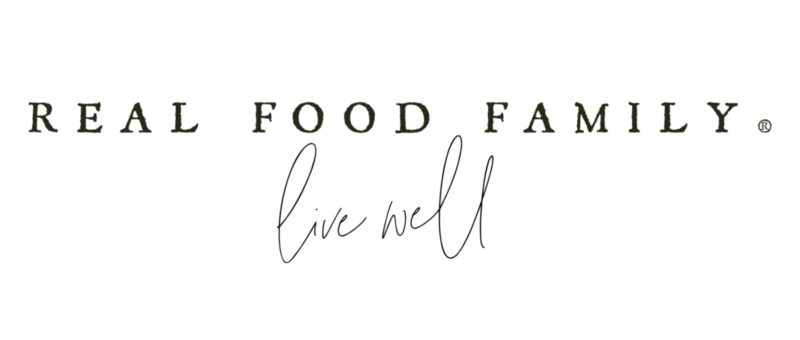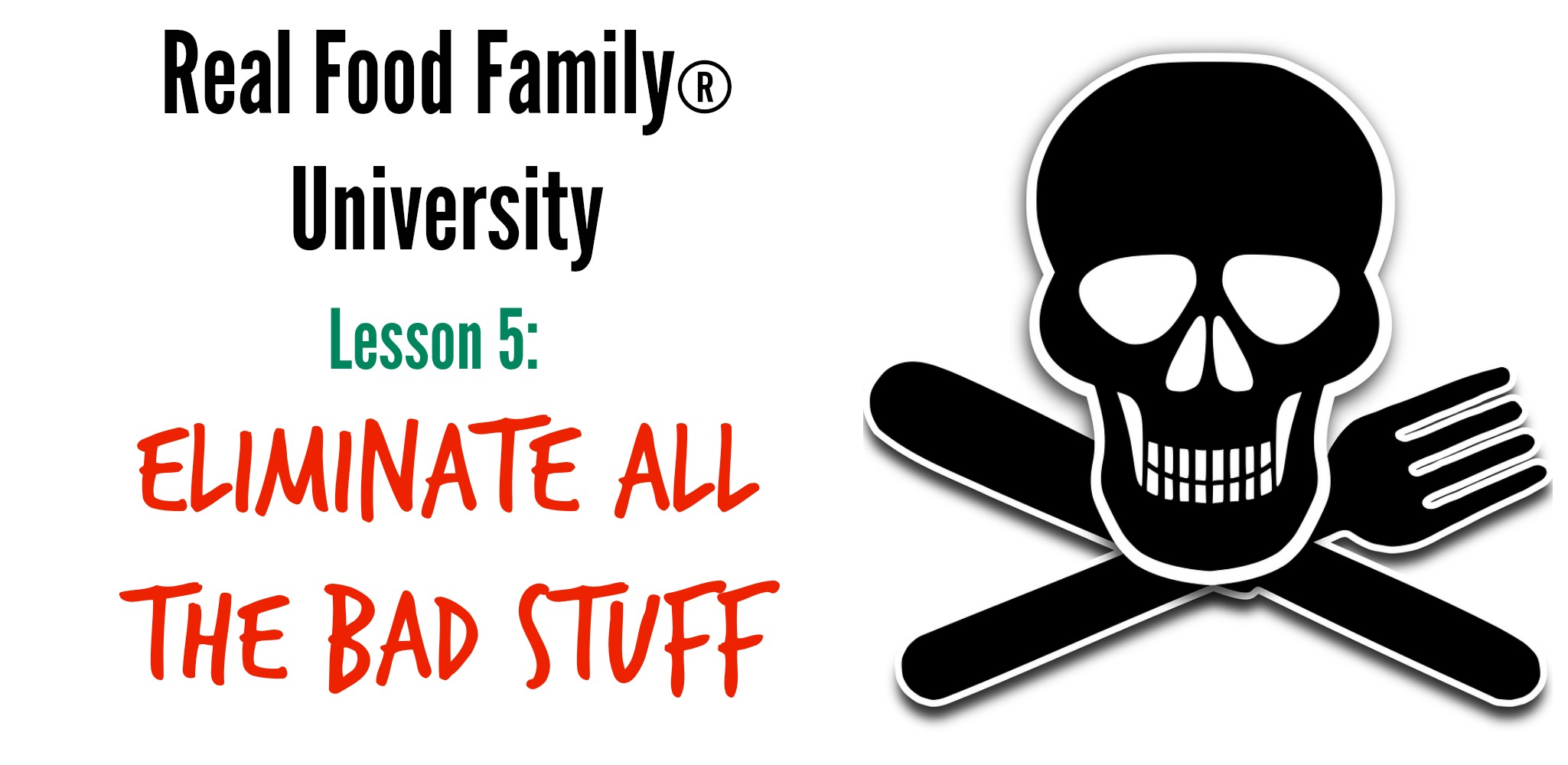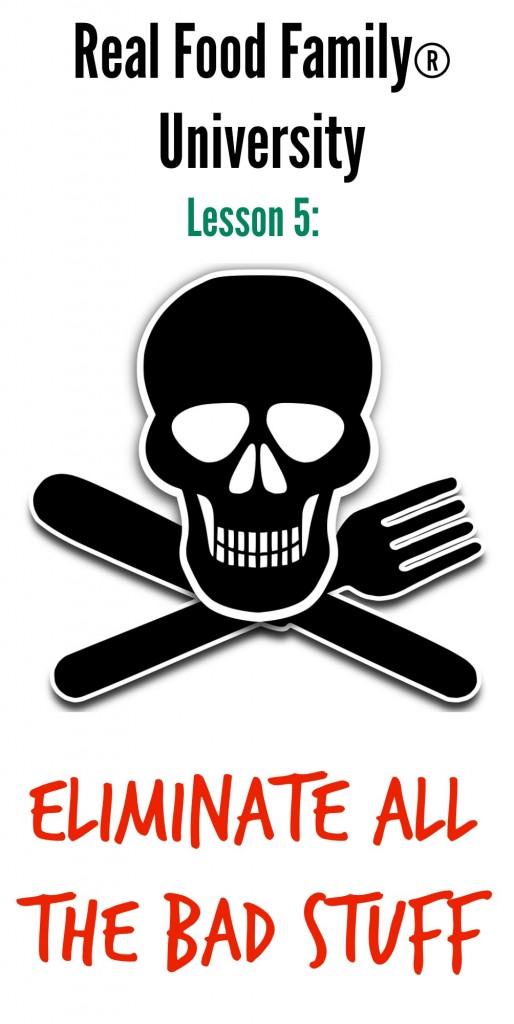Welcome to Real Food Family University, Lesson 5: Eliminate ALL The Bad Stuff.
As you continue to become a Real Food Family®, you should be consuming more nutrient-dense whole foods every day, especially everything on the list from Lesson 1: 5 Simple Foods to Add to Your Diet TODAY.
By now you should have also already taken the steps from Lesson 2 to “Get Rid of the Worst Offenders”.
Don’t forget, there are plenty of delicious ways to add nutrient-dense whole food meals into your family’s daily life starting right now! Use Real Food Family as your “go-to” website for recipes, tutorials, guides and support. Visit my Real Food Weekly meal plans library for over 75 weekly meal plans with recipes, shopping lists and tips.
Now it’s time to take a deeper look into a complete list of dietary dangers and work on eliminating more of these unhealthy, non-food items that are so common in our culture. This process may take weeks, months, or even years.
As I mentioned in Lesson 1, it’s not the wisest idea to suddenly force a completely new food lifestyle on a family- especially a family with kids. This “fad diet” approach almost always ends in disaster. A traditional, whole food diet and lifestyle is not something you “start” and “quit”. It is something that you adopt at your own pace so that the changes you make stick forever.
Start with the easiest steps, then keep taking more steps until you never look back.
The following is a list of “dietary dangers” from the Weston A. Price Foundation with my commentary underneath each point. I want to help you understand more about why we need to follow this valuable advice, and offer some sources to further your education on the subject.
Dietary Dangers:
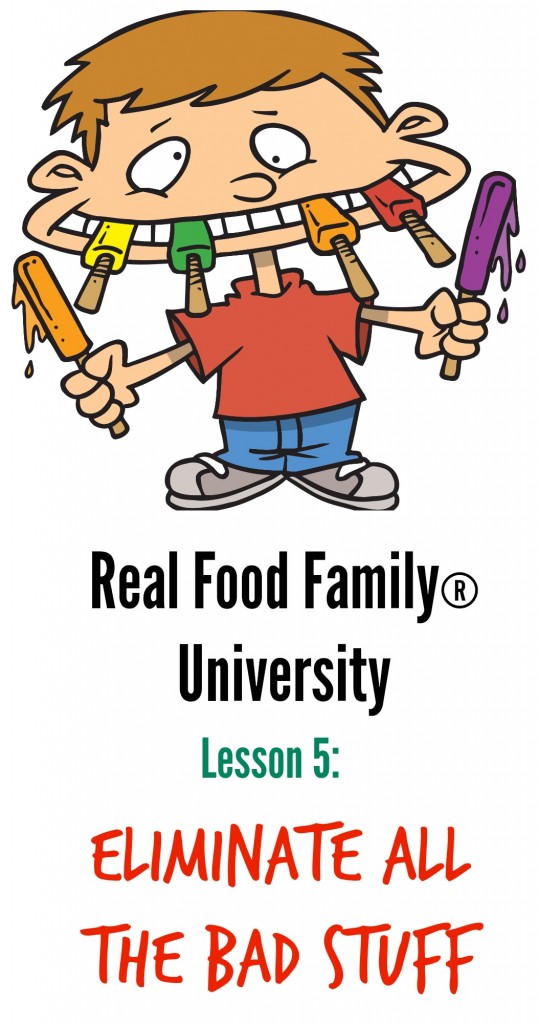 Don’t eat commercially processed foods such as cookies, cakes, crackers, TV dinners, soft drinks, packaged sauce mixes, etc.
Don’t eat commercially processed foods such as cookies, cakes, crackers, TV dinners, soft drinks, packaged sauce mixes, etc.
Do you actually know what “processed foods” are? Most people understand that soft drinks and fast food are “bad”, but what about bottled salad dressings (even the “natural” ones), crackers and “freshly baked” cookies? Part of becoming a Real Food Family® is to start looking at the ingredients list, and actually try to avoid foods that come with an ingredients list altogether. Even if something is labeled as “all natural”, it could still be made up of junk. Make sure you can pronounce every ingredient that is in your food!
Avoid all refined sweeteners such as sugar, dextrose, glucose and high fructose corn syrup.
Sugar truly is the root of almost all degenerative diseases we face today. Obesity, diabetes, heart disease, digestive disorders and even neurological disorders (because of the link to the digestive system and the way sugar affects your hormones and brain chemistry) can be attributed to the excess amounts of sugar in the diet. We believe honey, maple syrup, rapadura and even evaporated cane juice in small amounts are acceptable choices of sugar since they contain enzymes and other nutrients that are beneficial and lessen the negative impact of the sugar. White processed sugars and syrups should be strictly avoided. These processed sugars enter the bloodstream rapidly and immediately change your blood sugar levels and hormones. They also rob the body of essential vitamins and minerals. Highly processed sugars are most likely from genetically modified plants (GMO’s) or from plants treated with excessive toxic chemicals.
Avoid white flour & white flour products, and white rice.
Like sugar, white flour is highly processed, converts into sugar almost as rapidly as refined sugar, and has similarly deleterious effects on the body. Unbleached, organic/heirloom refined wheat or rice flour may be used in moderation, but not as a daily staple in a traditional foods diet. I recommend using Einkorn flour.
Avoid all hydrogenated or partially hydrogenated fats and oils.
As I mentioned in Lesson 2: Get Rid of the Worst Offenders, eliminating hydrogenated fats and oils, or TRANS FATS, should be a top priority. Trans fatty acids have been increasingly implicated as contributing to cancer, heart disease, auto-immune disease, tendon and bone degeneration and problems with fertility and growth. Trans fatty acids in partially hydrogenated vegetable oils are the main cause of type 2 diabetes, characterized by high levels of both insulin and glucose in the blood, because they inhibit the insulin receptors in the cell membranes (source).
Avoid all vegetable oils made from soy, corn, safflower, canola or cottonseed.
Most people consider “vegetable oil” to be healthy. This is a sad con-job committed by profit-driven fake science. It all started with the “lipid hypothesis” that assumed dietary fat is linked to weight gain and heart disease. Saturated fats were targeted (with no reason) as the “bad fats” and therefore chemically altered, highly processed vegetable oils became the fat of choice. What the science actually tells us is that saturated fat is not unhealthy- even in large amounts- and that oxidized fat and cholesterol and an imbalance of Omega 6 to Omega 3 fatty acids are what contribute to heart disease and other degenerative diseases. Fat molecules become oxidized when they are processed or heated too highly. Most vegetable oils are already rancid and oxidized by the time they reach the grocery store shelves, and cooking with these oils makes things even worse. Vegetable oils are almost entirely comprised of omega-6 fatty acids, which exacerbates the imbalance of omega-6 to omega-3 fatty acids.
Source:
The Oiling of America
Do not use polyunsaturated oils for cooking, sauteing or baking.
As mentioned in #5, the oxidation of fats is what is actually linked to heart disease and other degenerative diseases. Cooking with delicate polyunsaturated fats and oils oxidizes the fat molecules and causes damage to the body.
Avoid fried foods.
Since most fried foods are fried in excessively heated vegetable oils, not only is the oil used for cooking dangerous, but the high heat of frying can denature the proteins and oxidize the fats in the food you are frying. If you’d like to enjoy fried foods occasionally, make sure to use frying fats that are stable at high heats, such as organic beef tallow or lard. (Read why we think lard is a health food here.)
Do not practice veganism; animal products provide vital nutrients not found in plant foods.
The topic of eating meat and animal foods is a hot one, filled with passionate view points from all sides of the matter. We believe that animal foods are essential for optimal nutrition, and key nutrients for life cannot be obtained from plant foods alone. I’ve written a full article with a ton of sources on this topic: “To Vegetarians and Vegans, With Love”.
Avoid products containing protein powders.
Protein powders are often highly processed foods that contain denatured protein molecules. While protein is essential for human life, not all protein sources are the same. Here is a fantastic article explaining the benefits and dangers of various protein sources…and anything else you might want to know about protein.
Avoid pasteurized milk; do not consume lowfat milk, skim milk, powdered milk or imitation milk products.
While we consider whole-fat, raw milk and dairy foods from grass-fed cows or goats to be an essential nutrient-dense food, highly processed dairy impostors like pasteurized low-fat and non-fat options should be strictly avoided. Pasteurization and processing “cooks” the milk and kills the enzymes you need to properly digest the milk. Processed dairy also contains denatured protein molecules, oxidized fat molecules, and most of the naturally occurring vitamins and minerals have been destroyed. Be careful to look for powdered or dry milk in many packaged foods!
Avoid battery-produced eggs and factory-farmed meats.
This point is about nutrition and ethics. Not only is cheap, factory-farmed animal food less nutritious and toxic (typically containing hormones, antibiotics and pathogens from sick animals), but it is inhumane. I encourage you to visit a site called Meatrix to get an idea of what’s behind factory farming. Their cartoon videos do it in a way that isn’t as brutal and heartbreaking as seeing the real footage of CAFO’s (concentrated animal feeding operations).
Avoid highly processed luncheon meats and sausage containing MSG and other additives.
Highly processed and packaged deli meats and such often contain chemical additives and disgusting blends of inedible food items- including pink slime. There are plenty of organic options for things like hot dogs, sausage or thinly sliced meat for sandwiches, but it is imperative to avoid the cheap commercial versions.
Avoid rancid and improperly prepared seeds, nuts and grains found in granolas, quick rise breads and extruded breakfast cereals, as they block mineral absorption and cause intestinal distress.
Phytic acid is a nutrition topic that is rarely discussed, especially because things like whole grains, nuts, seeds and granolas are considered “health food” in our culture. The truth is that unless these foods are properly prepared by soaking, sprouting, and drying, they contain high amounts of an “anti-nutrient” called phytic acid. Phytic acid blocks mineral absorption and causes digestive distress. Diets that are high in grains, nuts and seeds often lead to serious health issues related to mineral deficiencies, including bone loss and tooth decay.
Source:
Living with Phytic Acid
Avoid canned, sprayed, waxed, bioengineered or irradiated fruits and vegetables.
You probably understand by now that non-organic fruits and vegetables should be avoided because of the dangerous toxins present on the food from being sprayed with pesticides and herbicides. Genetically modified organisms (GMO’s) are scientifically developed foods that often contain pesticides or chemical changes within the DNA of the plant. It is argued that GMO’s have not been properly tested for safety, and are most likely dangerous to human health based on the research done so far. Other chemicals found in fruits and vegetables come from wax used for preservation and chemicals that develop when foods are canned. It’s always best to choose fresh, organic fruits and vegetables from a local source.
Avoid artificial food additives, especially MSG, hydrolyzed vegetable protein and aspartame, which are neurotoxins. Most soups, sauce and broth mixes and commercial condiments contain MSG, even if not so labeled.
Monosodium Glutamate (MSG), hydrolized vegetable protein and aspartame are extremely common and found in most packaged food products, but they aren’t really “food” at all. These chemical compounds are designed to mimic natural foods and have been linked to a myriad of serious health problems. Be very careful to read food labels for these things.
Avoid caffeine-containing beverages such as coffee, tea and soft drinks. Avoid chocolate.
OUCH! This guideline is difficult…for me, at least. What the science tells us is that caffeine is both “bad” and “good”…meaning there are some benefits and some dangers to consuming caffeine. That means you have to make choices about caffeine based on your own body’s individual needs. Caffeine is mostly dangerous for those who struggle with blood sugar regulation, adrenal fatigue or hormone disorders. The truth is, most people have one of these problems, so caffeine should be avoided because of its dramatic impact on the adrenal glands. Pregnant and lactating women should avoid caffeine because of the baby’s inability to properly detoxify caffeine. If you choose to drink coffee or tea, be sure to avoid adding sugar, or at least use a small amount of raw honey as a sweetener. Because of the sugar, caffeine, food colorings and flavoring chemicals, soft drinks should be strictly avoided.
Avoid aluminum-containing foods such as commercial salt, baking powder and antacids. Do not use aluminum cookware or aluminum-containing deodorants.
Aluminum is considered a neurotoxin and is extremely dangerous to consume or let enter the blood. Aluminum is present in these food and personal care items as well as vaccines and many pharmaceutical drugs. Aluminum may even be more dangerous than mercury.
Sources:
NCBI: Human Health Risk Assessment for Aluminium, Aluminium Oxide and Aluminium Hydroxide
Aluminum More Dangerous Than Mercury
Do not drink fluoridated water.
Many people believe the myth that fluoride is an important “nutrient” for dental health. But the truth is that fluoride is an endocrine disruptor that can negatively affect your bones, brain, thyroid gland, pineal gland and even your blood sugar levels. While some studies may suggest that sodium fluoride- a pharmaceutical grade of fluoride- is beneficial, the dangers of consuming excess fluoride far outweigh the benefits. In addition to that, sixty five percent of the American water supply has been artificially treated with fluoride as hydrofluorosilicic acid; a toxic waste product of the aluminum and phosphate industries, which is also contaminated with lead, arsenic, radionucleotides, aluminum and other industrial contaminants. While fluoridation of the water system is outlawed in many nations (including China and most of Europe) because of studies proving its toxicity, the United States still fluoridates drinking water giving citizens no freedom of choice in the matter. Avoid fluoridated water by purchasing pure spring water for drinking water or using a water filter that eliminates fluoride.
Sources:
Dr. Osmunson Discusses the Dangers of Fluoride
National Research Council: Report of Fluoride Toxicity
Fluoridated Water Can Damage Your Brain,Disrupt Your Bones, and Stain and Pit Your Teeth
Facts About Fluoride
Nutrition, Fluoridation and Dental Health
Avoid synthetic vitamins and foods containing them.
The idea of taking a multi-vitamin may sound good, but the science shows that synthetic multi-vitamins have no actual health benefit and may even be damaging to health. Be aware that synthetic vitamins are added to most white flour products and breakfast cereals.
Source: Annals of Internal Medicine
Do not drink distilled liquors.
Consumption of alcoholic beverages not only leads to a compromised mental and physical state, but can cause liver damage and yeast overgrowth in the body. Distilled liquor raises another health concern because poor quality distilled beverages may contain a poisonous wood alcohol (methanol) that can be deadly.
Do not use a microwave oven.
Perhaps the biggest problem with microwave ovens is the lack of research performed to determine the safety of this method of cooking. The little research on microwave cooking that does exist seems to show a deleterious effect on human health, indicating abnormal changes to vitamin content and denaturing and oxidation of protein and fat molecules. The blood profiles of those who consume microwaved food is similar to the blood profiles of people in the early stages of cancer. Microwaving milk is dangerous as it alters the amino acids in a manner that can be toxic to the liver and nervous system. The microwaving of human milk for babies is especially dangerous as it destroys the disease-fighting properties of breast milk. Microwaves kill lysozyme activity, antibodies and foster the growth of more potentially pathogenic bacteria in the body.
Sources:
The Proven Dangers of Microwaves
Journey Back to The Kitchen with Sarah Pope
Also Eliminate Excess Toxins From Your Daily Life
We live in a toxic world. No matter where you go in the world, you will never escape the toxins produced by our industrial age. My final guideline in what to eliminate is not so much of a dietary danger as it is an environmental danger.
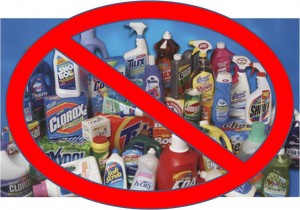
You can make a concerted effort to avoid excessive toxin exposure by first paying attention to the air you breathe. Of course cigarette smoking, as well as vapor smoking and any other kind of smoking, is toxic. Even if there is some natural “herb” or element you believe is beneficial- when you smoke it, you are exposing your delicate pneumatic system to toxins. Try to also avoid breathing exhaust from vehicles or the polluted air surrounding CAFO’s (concentrated animal feeding operations), non-organic farms that spray with chemical pesticides, and industrial plants. If you live close to one of these areas, or in a densely populated city, you should consider investing in a high quality air purifier to provide respite from the toxic environment when you are in your home.
While taking all of these measure to avoid toxins in the air are important, consider these additional facts:
- Most toxin exposure occurs within the home from paint, carpets, furniture, household cleaners, personal care products, among others
- The average U.S. household generates more than 20 pounds of hazardous waste each year
- 81,300 Chemical compounds have been registered with the E.P.A. in the past 30 years, and fewer than 20% have been tested for toxicity
- Over 20 million Americans have asthma, and the rates of asthma in children under age 5 have increased exponentially in the past three decades. Common household cleaners and appliances give off fumes that can potentially increase the risk of children developing asthma.
We are conducting a vast toxicologic experiment in our society, which our children and our children’s children are the experimental subject. – Dr. Herbert Needleman, pediatrician and professor at the University of Pittsburgh Medical Center
Instead of using chemicals in your home products, consider switching to homemade cleaners and personal care products using essential oils or purchase products that do not contain toxins. One of the best natural line of home care products available is Shaklee’s GET CLEAN. These products are natural, safe and effective and do not contain any of the common toxic ingredients found in commercial products like:
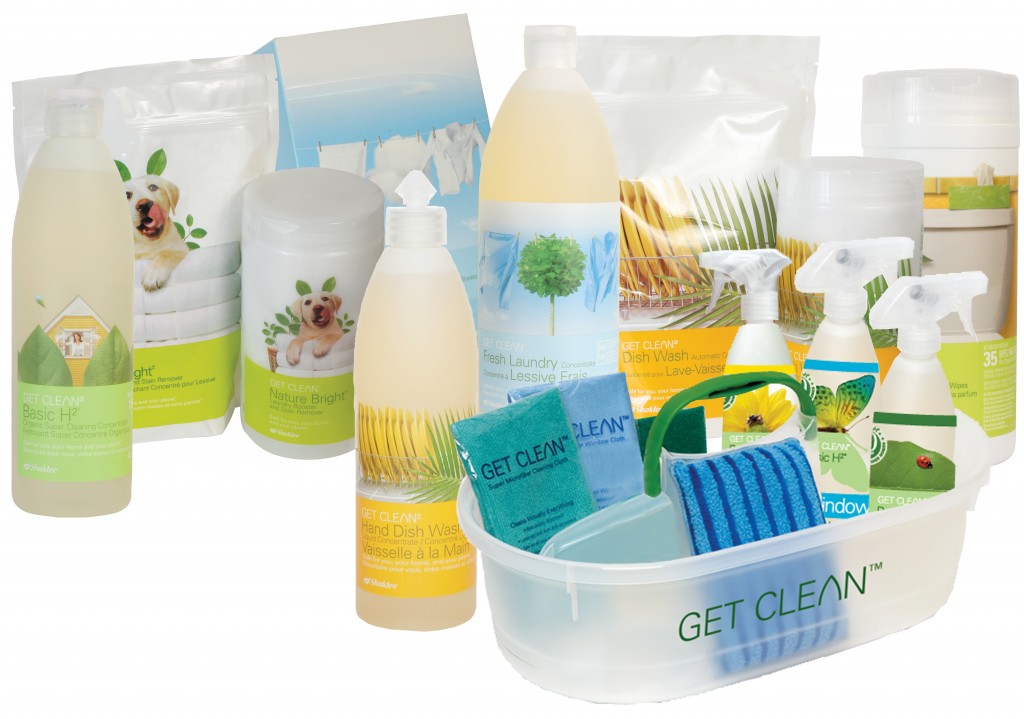 Volatile organic compounds (VOCs)
Volatile organic compounds (VOCs)- Kerosene
- Phenol
- Cresol
- Lye
- Hydrochloric acid
- Sulfuric acid
- Sulfamic acid
- Petroleum distillates
- Ammonia
- Sodium Hydroxide
- Butyl cellosolve
- Phosphoric acid
- Formaldehyde
- Chlorine bleach
- Morpholine
GET CLEAN products use biodegradable surfactants and are concentrated so the packaging eliminates waste. To learn more about GET CLEAN, you can visit Real Food Family’s GET CLEAN online store.
Final Note
Don’t be overwhelmed by this list! Start at your own pace, but try to create goals for you and your family.
Soon things will become second nature to you and because you’ll feel so good you’ll never look back! Just the peace of mind knowing you’ve eliminate dangerous food and toxins from your health and home are enough to make the effort to change.
Don’t forget to stay focused on ADDING delicious food every day by making nutritionally balanced meals with basic, real food ingredients.
